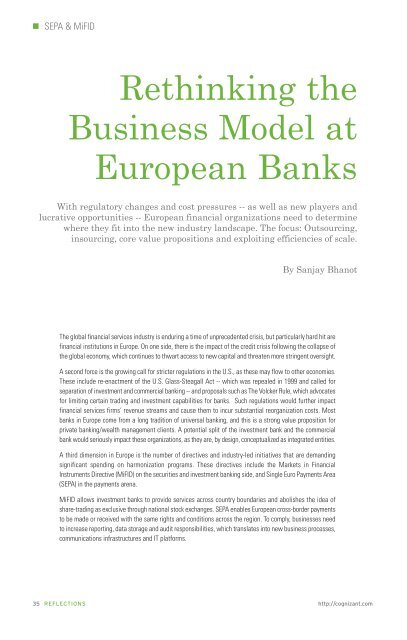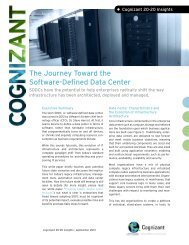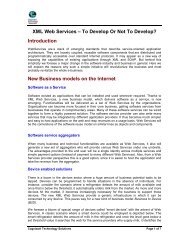Reflections - Cognizant
Reflections - Cognizant
Reflections - Cognizant
- No tags were found...
You also want an ePaper? Increase the reach of your titles
YUMPU automatically turns print PDFs into web optimized ePapers that Google loves.
■ SEPA & MiFIDRethinking theBusiness Model atEuropean BanksWith regulatory changes and cost pressures -- as well as new players andlucrative opportunities -- European financial organizations need to determinewhere they fit into the new industry landscape. The focus: Outsourcing,insourcing, core value propositions and exploiting efficiencies of scale.By Sanjay BhanotThe global financial services industry is enduring a time of unprecedented crisis, but particularly hard hit arefinancial institutions in Europe. On one side, there is the impact of the credit crisis following the collapse ofthe global economy, which continues to thwart access to new capital and threaten more stringent oversight.A second force is the growing call for stricter regulations in the U.S., as these may flow to other economies.These include re-enactment of the U.S. Glass-Steagall Act -- which was repealed in 1999 and called forseparation of investment and commercial banking -- and proposals such as The Volcker Rule, which advocatesfor limiting certain trading and investment capabilities for banks. Such regulations would further impactfinancial services firms’ revenue streams and cause them to incur substantial reorganization costs. Mostbanks in Europe come from a long tradition of universal banking, and this is a strong value proposition forprivate banking/wealth management clients. A potential split of the investment bank and the commercialbank would seriously impact these organizations, as they are, by design, conceptualized as integrated entities.A third dimension in Europe is the number of directives and industry-led initiatives that are demandingsignificant spending on harmonization programs. These directives include the Markets in FinancialInstruments Directive (MiFID) on the securities and investment banking side, and Single Euro Payments Area(SEPA) in the payments arena.MiFID allows investment banks to provide services across country boundaries and abolishes the idea ofshare-trading as exclusive through national stock exchanges. SEPA enables European cross-border paymentsto be made or received with the same rights and conditions across the region. To comply, businesses needto increase reporting, data storage and audit responsibilities, which translates into new business processes,communications infrastructures and IT platforms.35 REFLECTIONS http://cognizant.com
















